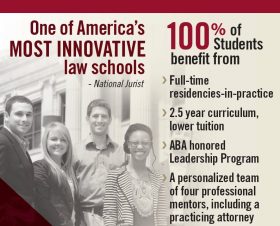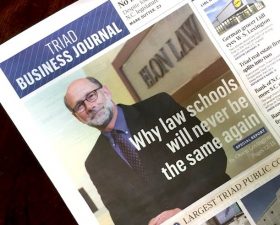The newspaper's June 5 cover story takes an in-depth look at Elon Law’s innovations, including full-time residencies-in-practice for all students and a redesigned curriculum that lowers tuition and accelerates careers.

The Triad Business Journal, the leading business publication based in Greensboro, N.C., featured Elon University School of Law in its June 5, 2015, cover story. The special report, headlined “Why law schools will never be the same again,” was written by reporter Owen Covington.
> Listen to the related story on WFDD radio, an NPR affiliate
“They are overhauling legal education for the long term in innovative ways that emphasize producing new lawyers faster, at less expense and with more real-world knowledge and experience,” the Business Journal article reports. “New law school graduates will emerge with less debt, and with résumés that boast of already having argued cases before judges, deposed witnesses and built a case from scratch.”
 Elon Law Dean Luke Bierman explains in the article why Elon decided to become the first law school in the nation to provide all entering students with a full-time, course-connected residency in the practice of law.
Elon Law Dean Luke Bierman explains in the article why Elon decided to become the first law school in the nation to provide all entering students with a full-time, course-connected residency in the practice of law.
“For a trimester, they will work in a law firm or in a judge’s chambers, to see what it’s like full time. They will be a part of the lawyer team,” Bierman says. “They will have that practical sense from their work during the day … and they’ll come back from full-time work with a better appreciation and understanding.
“They watch, they simulate and then they do, and then they’re ready,” Bierman continues. “We’re not wasting any time. We’re taking our students and fulfilling every minute we have them to do something important that builds the preparation they need to go out.”
Faith Rivers James, associate dean for experiential learning and leadership at Elon Law, details how Elon’s innovations are responsive to the changing dynamics of law practice.
“In this new normal environment, we understand that firms expect students to come with better practical skills, in addition to the foundation of legal knowledge,” Rivers James says. “When I started practicing in a major firm, I had the opportunity to work on cases and to develop my skills, and those hours were billed to clients. In this environment, some clients are saying they don’t want first- or second-year associates working on their projects at all. The apprenticeship type of learning has to shift back to law school.”
Tim Prosky, a recent graduate of Elon Law, comments on the value of the in-depth practical experience in tax law he had while in law school.
“Being [at the IRS, Office of Chief Counsel in Greensboro] full time allowed me to get more involved in the case,” said Prosky. “I was able to work more extensively on the brief and the memos, and interact with the taxpayer.”
The article notes that Prosky successfully argued a case before the chief justice of the U.S. Tax Court while in law school and that he is heading into a career in tax law. His supervisor while working at the IRS was Amy Seals, chief counsel for the Internal Revenue Service’s Greensboro office.
“Most law schools don’t teach the law student many practical things about being a lawyer,” Seals says in the Business Journal article. “They don’t learn, ‘what do I do when I receive a letter from the IRS? What do I do with my client? What do I file with the court?’ Because he’s here on a continuous basis, the learning experience is better for him.”
The Business Journal notes that Elon Law reduced its tuition by a total of $14,000, redesigned the law school curriculum from three years to two and a half years, and guaranteed that tuition would not increase for the entering class.
The special report focuses primarily on the scope and depth of experiential learning in Elon Law’s new curriculum, which begins with the entering class of 2015.
“Bierman said the emphasis is on creating a ‘sequence of learning’ that builds from earlier classroom experiences to that practical experience in the legal field,” the article says. “Introductory law courses give way to lab courses where students simulate working on actual legal cases, and then residencies in practice follow.”
> More information about Elon Law’s groundbreaking new approach to legal education is available here.


